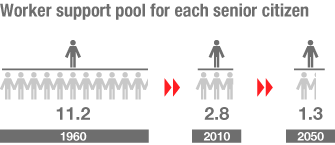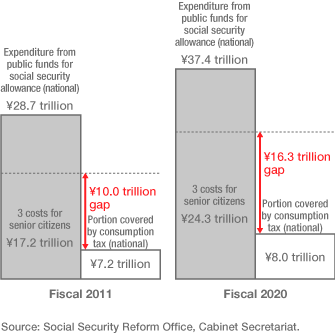
2012: Tipping Point for Social Security in Japan
Politics- English
- 日本語
- 简体字
- 繁體字
- Français
- Español
- العربية
- Русский
Prime Minister Noda Yoshihiko has expressed an “unwavering resolve” to achieve integrated reform of the social security and tax systems, with the focus on raising the consumption tax to 10% (from 5% at present) by fiscal 2015. There is widespread resistance to this plan in both the ruling and opposition parties, however, and it is far from certain that the relevant bills will pass when the government submits them to the Diet, probably in March. The outcome of this legislative effort is likely to command more attention than any other issue in 2012, a tipping-point year for Japan’s social security system that will have a decisive impact on the prospects for future stability.
The World’s Most Rapidly Aging Society

 On January 20 the government hastily convened a meeting of the five ministers involved to discuss integrated reform. The participants agreed to allocate all proceeds from the proposed consumption tax hike to the social security system. The idea is that one-fifth of the total, approximately ¥2.7 trillion, devoted to expanding the system, with the remaining four-fifths going to maintain the existing system.
On January 20 the government hastily convened a meeting of the five ministers involved to discuss integrated reform. The participants agreed to allocate all proceeds from the proposed consumption tax hike to the social security system. The idea is that one-fifth of the total, approximately ¥2.7 trillion, devoted to expanding the system, with the remaining four-fifths going to maintain the existing system.
The government had already announced that the proceeds from the 5% increase would be used to finance social security in an attempt to alleviate public aversion to higher taxes. The original scheme allotted around one-tenth of the increased tax revenue to offset additional government procurement costs, however, eliciting protests that the public would not accept any such diversion of the proceeds. This prompted a quick decision by Deputy Prime Minister Katsuya Okada, who joined the government in a Cabinet reshuffle on January 13, to revise the plan.
At present each senior citizen (age 65 or older) is supported by 2.8 workers. Forty years from now, that pool will have shrunk to just 1.3 workers. Government spending on pensions, health care, and assisted living amounted to ¥17.2 trillion in fiscal 2011. Current tax revenues fail to cover 60% of this total, or about ¥10 trillion—the government issues bonds to make up for the shortfall. By fiscal 2020 the deficit will rise to ¥16.3 trillion. Amid the creeping shadow of Europe’s fiscal crisis, with the national debt about to reach ¥1 quadrillion, a major tax increase is unavoidable.
A Hostile Environment for Reform
The plain truth is there will be no social security component to integrated reform without an increase in the consumption tax. In addition to covering the cost of maintaining the existing system, which includes 50% of the government’s liability for basic pensions (approximately ¥2.6 trillion), several new initiatives are essentially dependent on higher consumption tax revenue, including plans to reduce insurance premiums for people with low incomes (approximately ¥220 billion) and integrate the functions of preschools and daycare facilities (approximately ¥1 trillion). For this reason, the government is desperately trying to lay the groundwork for a tax increase.
But the environment remains hostile. The Noda administration called for bipartisan consultations between the ruling and opposition parties on raising the consumption tax; at the Liberal Democratic Party’s annual convention on January 22, LDP President Tanigaki Sadakazu dismissed these talks as “backroom wheeling and dealing.” The New Kōmeitō is essentially acting in lockstep with the LDP. Calls for the government to play it safe are coming not only from the opposition but from within the ruling Democratic Party of Japan. On the day of the LDP convention, former DPJ leader Ozawa Ichirō spoke at a meeting in the city of Kushiro in Hokkaidō, reiterating his opposition to increasing the consumption tax rate. In the absence of reforms, he said, a tax increase would amount to a breach of faith with voters.
A draft version of the integrated reform calls for new pension legislation to be submitted to the Diet in 2013, a provision also espoused in the DPJ manifesto in the lead-up to the 2009 general elections. Despite the dim prospect of success, this proposal was included at the last minute in an effort to secure the endorsement of Ozawa and others who hold the manifesto in high regard. The DPJ manifesto, however, led to the DPJ’s wresting power from the LDP and New Kōmeitō, and is openly loathed by the two opposition parties as a result. The result is that the government has obstructed its own path toward a tax increase and undermined the future of social security. (February 1, 2012)
(Originally written in Japanese.)
consumption tax assisted living health care national debt pensions integrated reform of tax and social security systems Yoshida Hiroshi